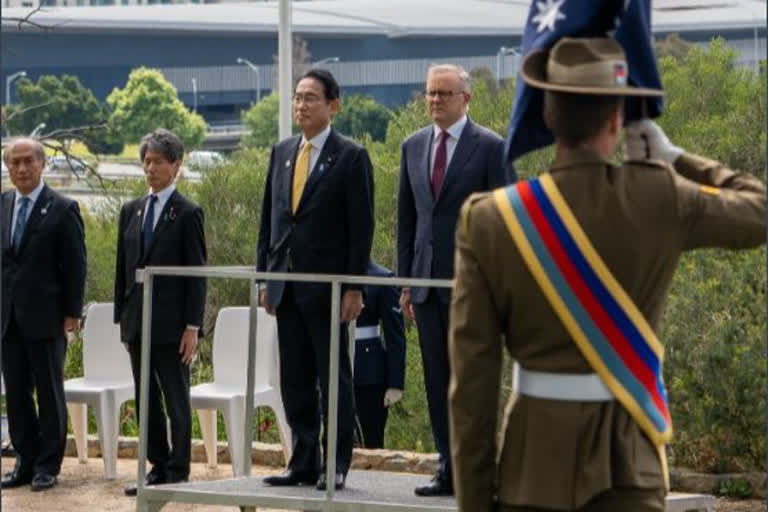Canberra: Japan and Australia on Saturday signed a new bilateral security agreement to reflect the deteriorating security outlook for their region driven by China's increasing assertiveness. The upgrade of the Joint Declaration on Security Cooperation, a pact first signed in 2007 when China's rise was less concerning, was the major outcome of Japanese Prime Minister Fumio Kishida's meeting with his Australian counterpart Anthony Albanese in the west coast city of Perth.
It builds on a reciprocal access agreement that Kishida inked in January with then-Australian Prime Minister Scott Morrison that removes obstacles to holding joint military exercises in either country. That is the first such agreement Japan has struck with any country other than the United States. Japan announced on Saturday that its Self-Defense Forces will train and take part in exercises with the Australian military in northern Australia for the first time under the agreement.
In the context of that agreement, Albanese told reporters: This landmark declaration sends a strong signal to the region of our strategic alignment. Kishida said the new framework of cooperation in operations, intelligence, information and logistical support had been developed under an increasingly harsh strategic environment. This renewed declaration ... will chart the direction of our security and defense cooperation in the next 10 years, Kishida said through an interpreter.
Kishida's visit for an annual bilateral summit is his fourth meeting with Albanese since the Australian leader's government was elected in May. They first met in Tokyo, two days after the election, for a summit of the Quadrilateral Security Dialogue, better known as the Quad, which brought Albanese and Kishida together with U.S. President Joe Biden and Indian Prime Minister Narendra Modi. The decision to hold Saturday's meeting in Perth, the capital of Western Australia state, which provides much of Japan's liquid natural gas and the wheat from which udon noodles are made, was symbolic of the close economic ties between the two countries.
Japan and Australia agreed to cooperate on energy security, which is threatened globally by Russia's invasion of Ukraine. Australia provides most of Japan's energy in the forms of LNG and coal. Kishida said he and Albanese were both deeply committed to nuclear disarmament and opposed the nuclear threat in Ukraine. Russia's recent rhetoric of possible use of nuclear weapons in Ukraine is deeply concerning, Kishida said. Russia's act of threatening the use of nuclear weapons is a serious threat to the peace and security of the international community and absolutely unacceptable, he added.
Japan and Australia also signed a critical minerals partnership that would strengthen supply chains for Japanese manufacturers. Australia's resources of critical minerals like antimony, cobalt, lithium, manganese ore, niobium, tungsten and vanadium rank in the top five globally, an Australian government website said. Australia is the world's top producer of lithium and rutile and the second-largest producer of zircon and rare earth elements.
China's defense budget has more than quadrupled since 2007 when Australia and Japan signed their first defense declaration. In 2006, Japanese warplanes scrambled to intercept 22 Chinese military aircraft in Japanese airspace. Last year, Japanese warplanes scrambled in response to 722 Chinese aircraft. Concerns about China's growing influence in the region heightened earlier this year when Beijing signed a security pact with the Solomon Islands that has raised fears of a Chinese naval base being established in the South Pacific less than 2,000 kilometers (1,200 miles) off Australia's northeast coast. (AP)



